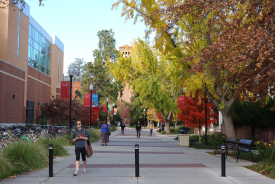Reducing deforestation could cut the amount of carbon dioxide emitted by as much as one-fifth, according to a recent study.
Researchers from the Universities of Edinburgh and Leeds in the United Kingdom found that tropical forests absorb almost two billion tonnes of carbon each year, equivalent to one-fifth of the world's carbon emissions, by storing it in their bark, leaves and soil.
However, an equivalent amount of carbon dioxide is lost or released into the atmosphere through logging, clearing of land for grazing, and growing biofuel crops such as palm oil, soya bean and sugar. Peat fires in forests add significantly to the greenhouse gas emissions.
"If all human-related deforestation of the tropics were to stop, the forests could absorb more carbon than at present, equivalent to one-fifth of global emissions," researchers said in a statement.
For the study, researchers collected and analyzed data from multiple previous studies, including satellite studies, to determine the amount of carbon absorbed and emitted by the world's tropical forests in South and Central America, equatorial Africa and Asia.
They said that if all human-related deforestation of the tropics were to stop, the forests could absorb more carbon than at present, equivalent to one-fifth of global emissions.
They warn that carbon emissions from tropical forests will increase as the climate warms, as rising temperatures accelerate the decay of dead plants and trees, giving off more carbon dioxide. Global temperatures are forecast to rise by two degrees by the year 2099, which is predicted to increase annual carbon emissions from the forest by three-quarters of a billion tonnes.
"If we limit human activity in the tropical forests of the world, this could play a valuable role in helping to curb the rise in carbon dioxide in the atmosphere," John Grace, leader of the study and professor at the University of Edinburgh's School of GeoSciences, said in a statement. "Preventing further losses of carbon from our tropical forests must remain a high priority."
The findings were recently published in the journal Global Change Biology.
© 2025 University Herald, All rights reserved. Do not reproduce without permission.








